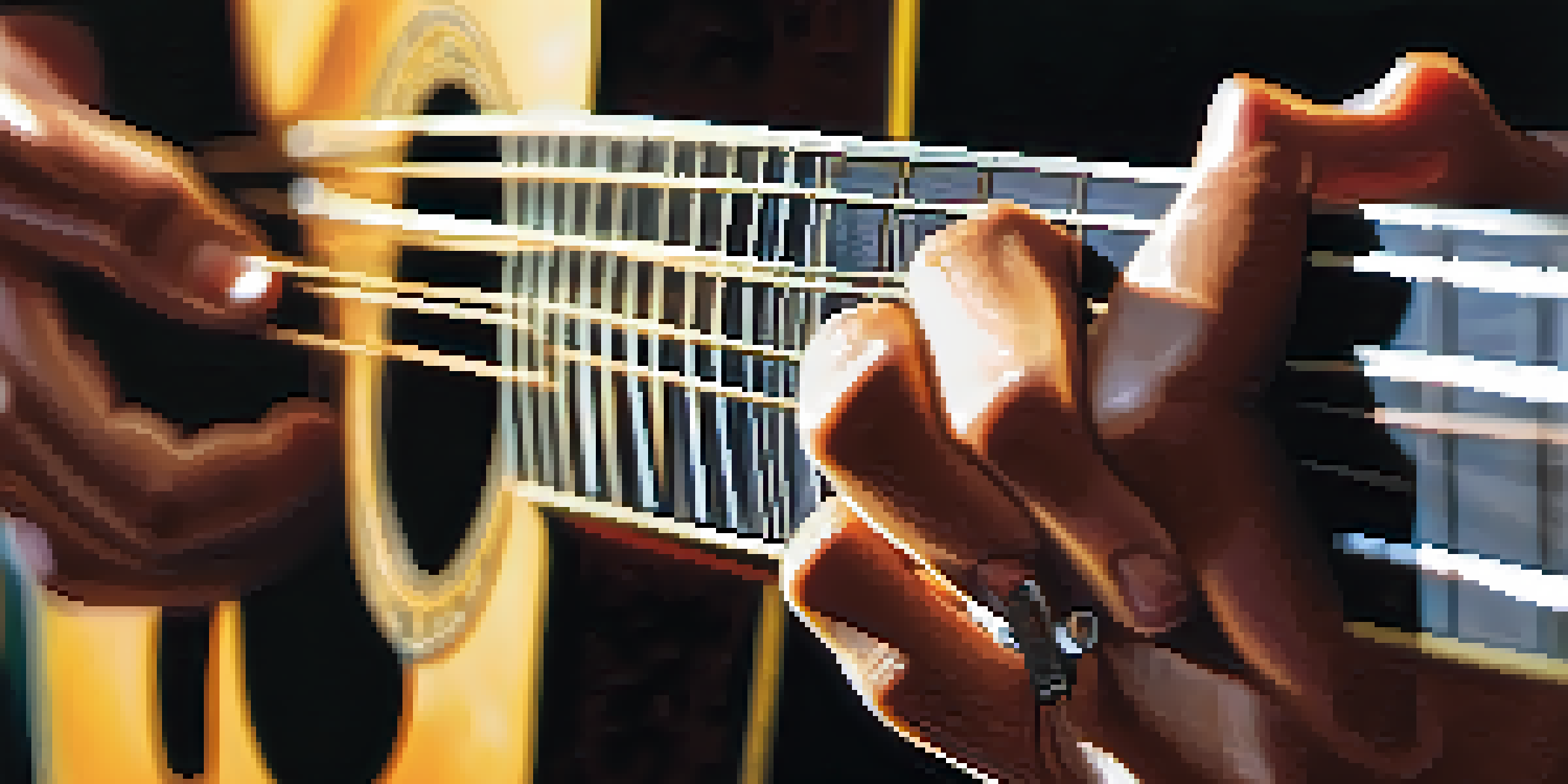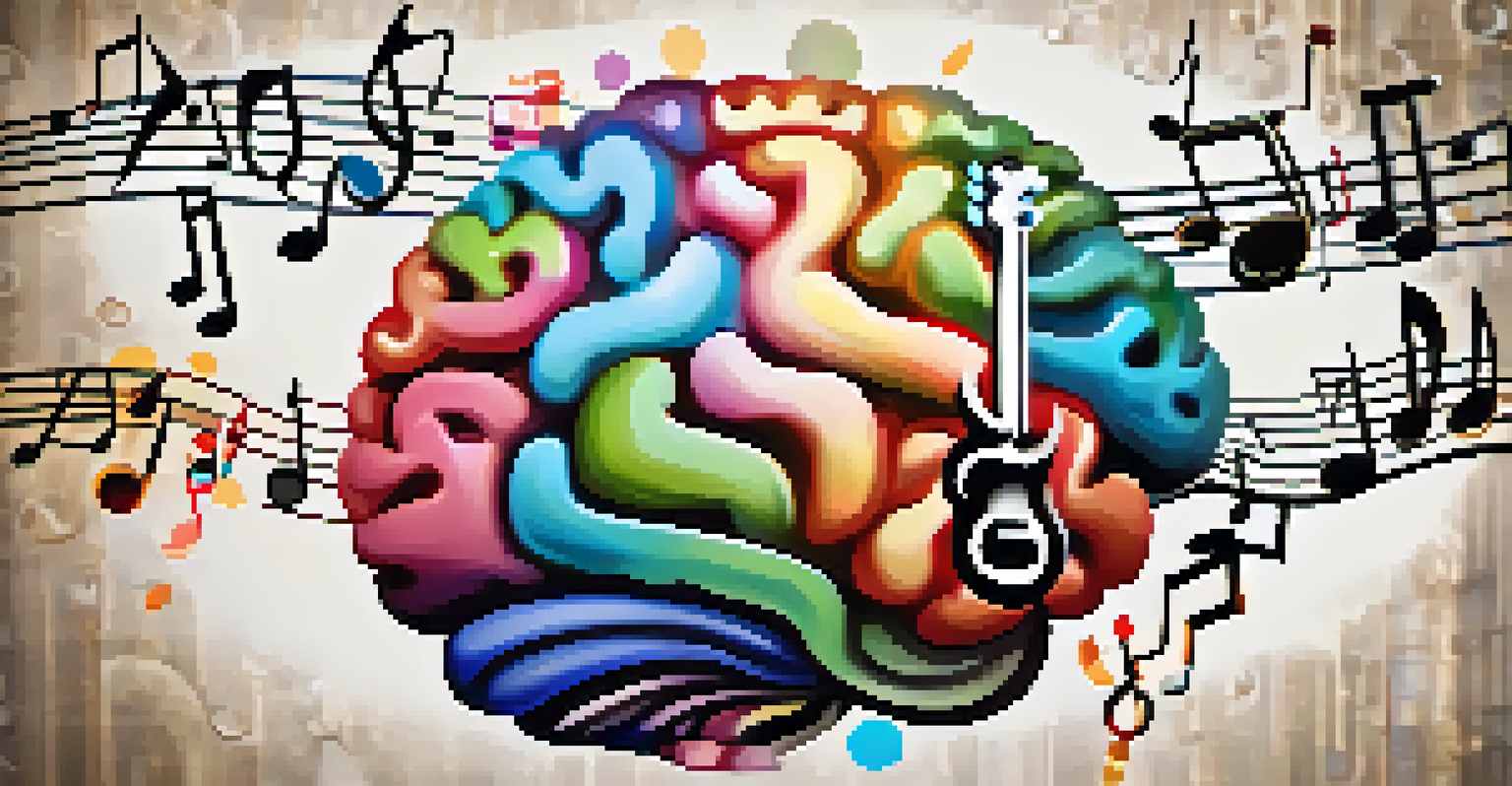Guitar and Memory: Enhancing Brain Function Through Music

The Connection Between Music and Memory Enhancement
Music has a profound impact on our brains, especially when it comes to memory. Studies have shown that engaging with music, like playing the guitar, can stimulate various areas of the brain, leading to improved cognitive functions. This connection is not just a coincidence; it’s rooted in how music activates neural pathways.
Music is the shorthand of emotion.
When we learn to play an instrument, we’re not just memorizing notes; we’re also developing skills like pattern recognition and auditory processing. This process can enhance both short-term and long-term memory, making it easier to recall information later. Essentially, the act of playing music can create a mental workout that sharpens our brain.
Moreover, music can evoke emotions and memories, making it a powerful tool for memory recall. For instance, hearing a familiar tune can transport you back to a specific moment in time. This emotional connection reinforces memory, showing just how intertwined music is with our cognitive abilities.
How Playing Guitar Engages Multiple Brain Areas
Playing the guitar isn't just about strumming strings; it's a complex activity that engages multiple brain regions. As you play, your brain coordinates movement, auditory processing, and even emotional expression. This multitasking is what makes guitar playing such a beneficial exercise for the brain.

When you focus on finger placement and rhythm, you’re actively enhancing your motor skills and hand-eye coordination. This physical engagement fosters neuroplasticity, which is the brain's ability to reorganize itself by forming new neural connections. The more you practice, the stronger these connections become, leading to improved overall brain function.
Music Boosts Memory and Cognition
Engaging with music, like playing the guitar, stimulates brain areas that enhance memory and cognitive functions.
Additionally, learning new songs or techniques requires memory retention and recall, further stimulating the brain. The challenge of mastering a complex piece can be compared to solving a puzzle, where each piece contributes to the overall picture. This cognitive challenge not only makes playing guitar enjoyable but also incredibly beneficial for mental sharpness.
The Role of Rhythm in Memory and Learning
Rhythm is a fundamental aspect of music that plays a crucial role in memory retention. When playing the guitar, you often have to keep a steady beat, which can enhance your ability to memorize sequences. Research shows that rhythmic patterns can help anchor information in our minds, making it easier to recall later.
The beautiful thing about learning is that no one can take it away from you.
Consider how children often learn through songs and rhymes. The rhythm and melody help them remember facts and concepts more effectively, demonstrating the power of music in learning. Similarly, guitar players often find it easier to memorize chord progressions and lyrics due to the rhythmic nature of the music.
This connection between rhythm and memory can also apply to other areas of life, including language learning and mathematical concepts. By incorporating rhythm into practice, guitarists can make the learning process more enjoyable and effective, proving that music is not just an art form but a valuable educational tool.
Emotional Benefits of Playing the Guitar
Playing the guitar can be a fantastic outlet for emotions, which in turn has positive effects on memory and brain health. When you express feelings through music, you engage the emotional centers of the brain, which can improve mood and reduce stress. Lower stress levels are beneficial for cognitive functions, including memory.
Moreover, creating music often leads to a state of flow, where you lose track of time and become fully immersed in the moment. This state not only enhances creativity but also promotes a deeper connection with the music, making it more memorable. When you’re emotionally invested in what you’re playing, you’re likely to remember it better.
Guitar Playing Enhances Brain Function
Learning to play the guitar involves multitasking that promotes neuroplasticity and strengthens brain connections.
The act of playing guitar can also foster social connections when shared with others, further enhancing emotional well-being. Whether jamming with friends or performing in front of an audience, these experiences can create lasting memories and deepen interpersonal bonds, ultimately benefiting your overall cognitive health.
Guitar as a Tool for Cognitive Rehabilitation
Interestingly, playing the guitar can serve as a powerful tool for cognitive rehabilitation, especially for individuals recovering from brain injuries or strokes. Music therapy, which often includes guitar playing, has been shown to improve memory and cognitive function in patients. This form of therapy utilizes the brain's natural affinity for music to encourage healing.
For patients, learning to play the guitar can help regain motor skills and cognitive abilities that may have been affected by injury. It promotes focus and concentration, as players must pay attention to their movements and the music. This cognitive engagement can lead to improvements in memory and overall brain function over time.
Furthermore, the emotional and social aspects of playing guitar can aid in recovery. Engaging with music can provide a sense of normalcy and joy, which are crucial for mental health during rehabilitation. Overall, the guitar can be a versatile tool, not just for musicians, but also for those on the road to recovery.
Tips for Incorporating Guitar into Daily Life
Incorporating guitar into your daily routine can be a rewarding way to enhance your brain function. Start small; even 10-15 minutes a day can make a significant difference. Whether you’re practicing scales, learning a new song, or simply strumming along to your favorite tunes, consistency is key.
Consider mixing up your practice to keep things fresh and engaging. You might focus on different genres, explore songwriting, or even collaborate with other musicians. This variety not only keeps your interest alive but also challenges your brain in new ways, enhancing your cognitive abilities further.
Emotional Benefits of Music
Playing the guitar serves as an emotional outlet that improves mood and reduces stress, positively impacting memory and cognitive health.
Lastly, don’t forget to enjoy the process! Music should be a source of joy, so approach your guitar playing with a playful mindset. As you embrace the fun and creativity of making music, you’ll naturally reap the cognitive benefits that come along with it.
Conclusion: The Lasting Impact of Music on Memory
In conclusion, the relationship between guitar playing and memory enhancement is both fascinating and beneficial. The way music engages our brains, fosters emotional connections, and encourages cognitive challenges makes it a powerful tool for improving memory. Whether you’re a seasoned guitarist or a beginner, the positive effects of music on brain function are undeniable.
By playing the guitar, you not only enrich your own life but also contribute to your cognitive health. Every strum and chord progression can serve as a mental workout, strengthening your brain in the process. As you grow your skills, you’ll find that the benefits extend beyond music into other areas of your life.

So, pick up that guitar and start strumming! The journey of learning and creating music can lead to improved memory and brain function, enriching your life in countless ways. Remember, every note you play is not only a step toward musical mastery but also a stride toward a sharper, more vibrant mind.